
No sooner had we made our request for information on the 1970 ‘First Grade 1 Medley Worlds’ held at Hazelhead Park, Aberdeen, than reader Trevor Clydesdale came up with the goods. Trevor kindly forwarded cuttings from the local Press & Journal newspaper, relevant excerpts from their report below….
THE BEST pipe band in the World – that’s Shotts and Dykehead Caledonia Pipe Band. Under Pipe Major T. McAllister. Jun., they pipped their nearest rivals Muirhead and Sons, Grangemouth, by a mere quarter point at the World Pipe Band Championship at Hazlehead, Aberdeen, on Saturday.
Muirhead’s, who have held the title since 1965, had to be content with second place and to see the News of the World Cup go back to Shotts, who last held it in 1960. Along with the trophy, Shotts received £100. They also won the Carlton Championship Cup for drumming.
Third place in the championship went to the Edinburgh City Police Pipe Band who were only a half point behind Muirheads……
Aberdeen’s women’s bands swept the board. The best women’s pipe band were the Deeside Ladies, with City of Aberdeen Ladies second, and Bon-Accord Ladies third.
Turiff Pipe Band Major [sic], George Hepburn, celebrated his 50th year with the band at the championship along with his son, Pipe Sergeant William (40), and his grandson William (14), also a piper in the band.

The stocky 63-year-old Pipe Major, who was responsible for resurrecting the band after World War II, plans to retire in November.
North and north-east bands did well in the championship. Aberdeen City Police won the marching and discipline section in the Grade 2 championship, and Elgin and District British Legion won the section in Grade Four. Dingwall British Legion were second in Grade Four. Results:
Grade Two
1 Robert Armstrong Memorial, Belfast
2 Mount Carmel, Salford
3 Knightswood, Glasgow
Drumming: Knightswood
Grade Three
1 Singer, Clydebank
2 Milngavie
3 Carluke Caledonia
Drumming: Carluke
Marching & Discipline: Queen Victoria School, Dunblane

Grade Four
1 Alloa Collieries
2 Dingwall British Legion
3 93rd Glasgow BB
Drumming: Alloa
Juvenile
1 Knightswood Juveniles
2 214 BB, Glasgow
Drumming: Knightswood
Marching and Discipline: 214 BB
Novice Juvenile
1 Polkemmet Juvenile
2 Dysart & Dundonald
3 1st St Andrews BB
The Editor writes: I have already written about the Grade 1 championship but some other points arise from perusing the above results. My band, the 214 BB, was pushed into second that day by a resurgent Knightswood Juveniles, the community band from the west end of Glasgow.
Like us they had top class instructors and a whole team of organisers with a senior band doing well in Grade 2 as can be seen. I don’t know much about the Mount Carmel band from Lancashire but I do remember them having an outstanding tone – and feather bonnets, a big deal at the time.
Singer taking Grade 3 was a great win for them. I’m pretty sure Maurice Pert was still P/M. They nudged ahead of Milngavie the 1969 G3 winners. Milngavie were set up by local BBC Scottish Symphony Orchestra flautist and piper George McIllwham and always had a fine sound.
Robert Armstrong Memorial, I think, were promoted to Grade 1 the following year after their Grade 2 victory. They were an outstanding band and paved the way for the success of the Northern Irish bands of the future.
I don’t know much about the Polkemmet juvenile band and if they morphed into Robert Mathieson’s groundbreaking Grade 1 band of the 1980s. Info gratefully received. Note a first appearance of Bob Shepherd’s Dysart in Juvenile. His senior band would go on to take two Worlds G1 titles later in the decade. Note too P/M John MacKenzie’s QVS winning the M&D in G3. They were always a very smart boys band as anyone who saw them at their regular Scotland international rugby matches would attest.

















I saw the scoresheet John McAllister changed to gift that championship to Shotts.
Can’t do a press cutting, but the World’s in Aberdeen, June 1970, was my first pipe band contest, with Monktonhall. Playing in Grade 3 it was a 5 o’clock start to get up to Aberdeen for the draw, on the day, and we were 5th with Donald Cameron, John Roy Stewart and Major Manson as MSR. I think medleys were introduced for lower grades the following year. Interesting names on the article. Dingwall, then in Grade 4, were on their way up to Grade 1. I thought Dysart had a band in Grade 3 that year too. The BBC made a programme of the day which would be good to see.
Competing against the Mount Carmel band back in the 60’s, I well recall the distinctive feather bonnets they had – all as normal but for a tuft of white feathers at the end of each tail! Much of their success had to be down to the fact that the Pipe Major, Walter McMinn, had many of his players from young who, over the years, he coached into a tight unit.